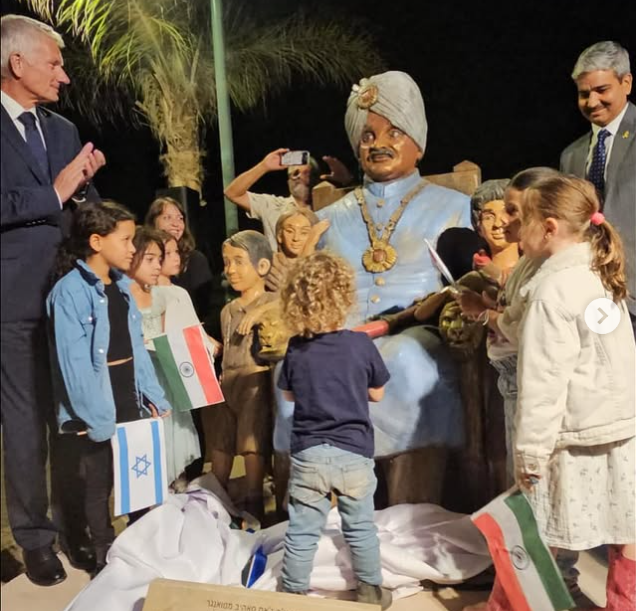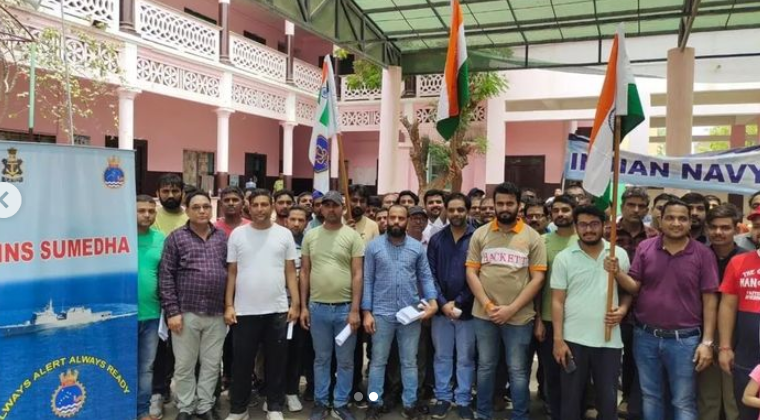Table of Contents
MOSHAV NEVATIM, Israel — The humanitarian efforts of Maharaja Digvijaysinhji Ranjitsinhji, who sheltered nearly 1,000 Polish children—many of them Jewish—during World War II, were permanently enshrined this week with the unveiling of his statue in Moshav Nevatim, southern Israel.
The ceremony, held on November 11, 2025, served as a significant tribute to the Maharaja’s extraordinary compassion. It was organized jointly by the Indian Jewish Heritage Centre (IJHC) and the Cochini Jewish Heritage Centre (CJHC).
The event drew senior diplomatic representation, including India’s Ambassador to Israel, J.P. Singh, and Poland’s Ambassador to Israel, Maciej Hunia, underscoring the enduring ties between the three nations.
Wartime Refuge in Nawanagar
In 1942, as the then-Maharaja of Nawanagar (now Jamnagar, Gujarat), Digvijaysinhji famously opened his summer palace in Balachadi. He provided a secure refuge for Polish children who had fled the ravages of the war and Soviet deportation. The Maharaja ensured they received comprehensive care, including shelter, food, education, and medical support, earning him the revered title, “The Good Maharaja.”
A Permanent Memorial
The newly unveiled statue, created by artist Sam Philips and donated by Jerry Klinger, stands as a lasting symbol of the Maharaja’s empathy.
The tribute in Israel follows years of recognition by Poland, which continues to honour his memory with a dedicated square, a monument, and a tram named after him in Warsaw—all gestures of deep gratitude for India’s crucial wartime support. The statue in Moshav Nevatim further solidifies the historic links connecting India, Poland, and Israel through this powerful story of humanitarian courage.
The Life and Legacy of the “Good Maharaja”
Sir Digvijaysinhji Ranjitsinhji Jadeja (1895–1966) was the Maharaja Jam Sahib of Nawanagar (present-day Jamnagar, Gujarat) from 1933 until its merger with the United State of Kathiawar in 1948, and he continued as the titular ruler until his death.
Early Life and Career
-
Family & Education: He was the nephew and successor of the famous cricketer, K.S. Ranjitsinhji. He was educated at Rajkumar College, Rajkot, Malvern College, and University College London.
-
Military Service: He had a distinguished military career in the British Indian Army, serving with the Egyptian Expeditionary Force and the Waziristan Field Force, retiring as a Captain in 1931, but later receiving honorary promotions up to Lieutenant-General.
-
Princely Rule: As Maharaja, he was known for continuing his uncle’s policies of development and public service. He also served as the President of the Chamber of Princes from 1937 to 1943. He was a keen patron of cricket, serving as the President of the Board of Control for Cricket in India (BCCI) in 1937–38.
The Humanitarian Act (The Polish Children)
His enduring legacy stems from his actions during World War II:
-
The Refuge: In 1942, nearly a thousand Polish children, who had been deported to Soviet labour camps (gulags) after the 1939 invasion of Poland and were subsequently evacuated through the Soviet Union, found themselves in desperate need of safe haven. Many countries were unwilling or unable to take them.
-
The Camp: The Maharaja opened his summer palace grounds in Balachadi, near Jamnagar, where he personally established a refugee camp. He provided them with food, clothing, education (with Polish teachers), medical care, and facilities for practicing their Catholic faith until 1946.
-
His Words: His famous welcoming words to the children are inscribed on a memorial in Poland: “I am your Bapu (father), just like I am father to all Nawanagaris. Therefore, you are no longer orphans today.”
-
Recognition: His profound generosity earned him the Polish title “Dobry Maharaja” (The Good Maharaja).
Post-War and Polish Honours
-
After India’s independence, he served as a delegate of the newly independent nation to the United Nations.
-
Poland has consistently honoured his memory:
-
A monument and the “Good Maharaja’s Square” (Skwer Dobrego Maharadzy) are named after him in Warsaw.
-
Multiple schools in Poland bear his name.
-
He was posthumously awarded the Commander’s Cross of the Order of Merit of the Republic of Poland in 2011.
-




